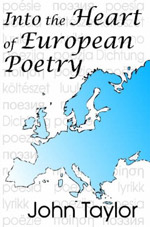Reviews: Into the Heart of European Poetry |
|
|
 |
Is there such a thing as contemporary European poetry? Is there a European culture, a single European dream? I don't think so – at least not yet. John Taylor is American. An American in Paris since 1977. Perhaps from the distance Europe looks a more homogenous entity than from my Austrian born perspective. Poetry is deeply embedded into one's language, depends on its historical and cultural context, so naturally a lot is always lost in translation, and simply does not translate. Nevertheless Taylor embarks with passion on his project to travel into the heart of Europe. He does so by relying on translated (established) poetry only. Flicking through the 400 pages I haven't spotted one poem in its original language. Reviewers have called this book a travel guide. Perhaps it is one in a literary world, and cannot be anything else but a glimpse over the many fences. Is that a good thing? Well, yes! Is it high time for the English-speaking reader to discover that not everybody else speaks English. Taylor spends about 50 pages on German-speaking countries, which is the only area where I could comment from my own experience (for some reason he completely omits English-speaking European countries). For all the other language areas I have to rely on translations – and the words of the translators. As tempting as it might seem, we cannot learn every language, we have to use books like this to understand a little bit more of our world. But I'm curious. So for the time being I am happy to travel along into the heart of poetry, wherever that is. I very much look forward to the journey. |
Reviewed by Gerald Ganglbauer, 11 November 2008 |
|
Dear Gerald Ganglbauer, The publicity agent at Transaction has just sent me a copy of your review of "Into the Heart of European Poetry," and I remember that I had contacted you previously. As far as I can tell, you are the first reviewer of this book. May I react to a couple of things that you wrote? I think it is stated clearly, in my Introduction, that I do not believe that there is a single European culture or dream. I point out that national literary and linguistic traditions are extremely important, and in numerous essays included in the book I try to explain some of those specific traditions or influences or literary forms to English readers who will not be acquainted with them. What I posit, in the Introduction, are a few common denominators among European writers (with respect to their North American counterparts), but I once again also stipulate that these hypothetical, general, unifying elements are always informed by specific national, cultural, and linguistic contexts. These hypothetical unifying elements involve such fields as history, geography, politics, religion, philosophy, and literary techniques (the history of forms). As to translations, I actually know a few languages, including your native tongue, and dabble in many others. As in my two books about contemporary French literature, which have been issued by the same publisher, I decided to make Into the Heart of European Poetry available to a fairly wide readership, by which I mean that I did not want to give the essays a meticulous academic form (with quotations in the original foreign languages placed alongside the translations, or in footnotes). When you read the essays (for example, the ones on Bachmann and Bernhard, to stick to Austria), you will often see that I have read translations very closely, comparing them to the originals). It is true that most of these essays were initially published as reviews or articles in literary magazines or supplements, so I was originally reacting, as a critic, to translations that had become available. As you know from your life in Australia, and as you in fact point out in your review, very little poetry (and prose) is translated into English; and English readers are little aware, if at all, of what is written elsewhere. So it seemed worthwhile to gather these pieces under one cover, if only to raise some of the questions about Europe that you yourself raise. Moreover, several of the essays represent the only, or one of the very rare, English-language critical reactions to the book or poet in question. And of course there are many lacunae, though exhaustiveness was never my intention, nor, of course, within a single critic's possibilities; but as I also note in the Introduction, this European project will continue, even as my purview of contemporary French literature--my true specialty--continues and will, hopefully, result in a third volume one day. By the way, in my next "Poetry Today" column in the Antioch Review, I present quite a few German-language poets, including Durs Grünbein, Ulf Stolterfoht, Dieter M. Gräf, and several others who are included in Michael Hofmann's recent anthology "Twentieth-Century German Poetry". Finally, I also mention in the Introduction why I did not include English-language poets. And personally, I am not at all sure that the book is a "travel guide". Another critic wrote that about the two volumes of my essays on contemporary French literature. What I hope is that the essays constitute good literary criticism! But that is for you to decide. Many thanks for your interest. Good wishes, 44 rue du Pressoir P.S. Although I lived in Paris between 1977 and 1987, I now live near Angers (between Tours and Nantes), in the Lower Loire Valley. |
|
Comment by John Taylor, 12 November 2008 |
|